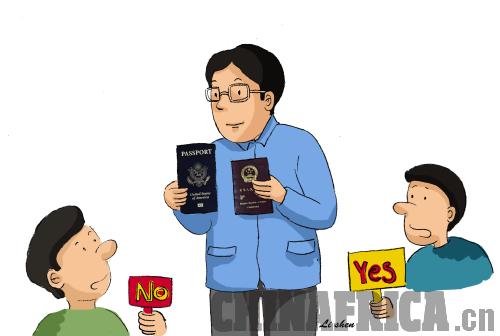| 
In April this year, Chen Yiyu, Member of the Standing Committee of the 11th National People's Congress told the 26th session that a number of overseas Chinese possess dual citizenship because they didn't report to Chinese authorities after gaining foreign citizenships.
As soon as his remarks went public, the discussion on whether China should recognize dual citizenship dominated debates. Supporters believe recognizing dual citizenship will encourage and facilitate the influx of talent and attract more foreign capital and technology.
However, those who are against it maintain that one should be loyal to only one country. China's single citizenship safeguards the country's interests and facilitates the implementation of law.
China now only permits single nationality, stipulating taking foreign citizenship means the automatic loss of Chinese nationality.
About 90 countries and regions worldwide recognize dual or multiple citizenships. Among them many are emerging countries such as South Korea, Viet Nam, India, the Philippines, Brazil and Mexico.
FOR
Wang Chuantao
Media commentator
In an open society, dual citizenship should be recognized.
China's current nationality policy prevents many foreigners from immigrating. The whole world has witnessed China's economic achievement and future growth potential, which attracts more and more foreigners hoping to work and settle down. However, if they want to get Chinese citizenship, they have to give up their former one. Reluctant to do so, these foreigners abandon the intention of starting businesses in China.
On the other hand, the single citizenship doesn't stop Chinese from emigrating, but rather pushes them to do so. In reality, many rich or powerful people actually have dual citizenship. They got foreign citizenship but don't report it to the authorities or have their household registration canceled as required. This brings more problems to social management.
Wu Qiang
Oversea Chinese student
The single citizenship brings a lot of inconveniences for overseas Chinese who return to China for visits as they are treated as foreigners. For example, as an overseas Chinese, if you come back to the motherland to visit your parents who are still Chinese citizens and you want to live in their home, you have to report your arrival to local police within 24 hours. And if you want to find a job in China or live with your juvenile children of Chinese citizenship, cumbersome red tape procedures are required.
Wang Huiyao
The Beijing News
Under the circumstances of globalization, recognizing dual citizenship is conductive to attracting overseas talents, capital and technologies. Without costing any money, the change will pull back many Chinese senior talents and entrepreneurs of foreign nationalities and keep overseas Chinese in the motherland.
China's single nationality regulation had its special historical background. In the 1950s, China didn't establish diplomatic relations with some countries in Southeast Asia. The single citizenship then protected Chinese in those countries from negative ideological influences. However, since the reform and opening up, single citizenship is outdated.
Overseas Chinese have made great contributions to China's economic accomplishment. From 1978 to 2005, China introduced total foreign investment of about $622.4 billion, of which about 67 percent was credited to overseas Chinese. About 70 percent of more than 550,000 foreign-funded enterprises were established by overseas Chinese. More than 7 million Chinese emigrated to foreign countries after the reform and opening up and more than 1 million Chinese students studied abroad. These people have enormous combined financial, technical and intellectual resources. If the nationality ban is lifted, they can contribute more to China's economy.
|